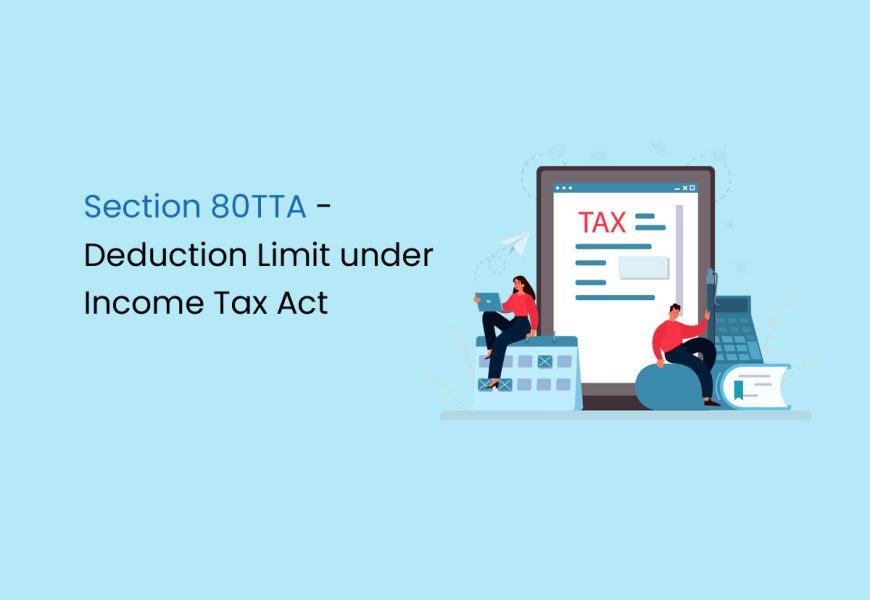Almost all of our money is taxable. The interest your savings bank accrues is also taxable! If you have wondered about even this income is taxable, then you must have thought about how to save tax on it too!
Many individuals hold savings bank accounts, but it’s often overlooked that the interest earned on these accounts is taxable under the category of ‘Income from other sources.’ However, there’s a way to save on taxes for the interest received, up to Rs 10,000. Section 80TTA of the Income Tax Act, 1961 offers a deduction of Rs 10,000 on such interest income. Let’s explore the intricacies of Section 80TTA in greater detail in this article.
What is Section 80TTA?
Section 80TTA is a provision in the Income Tax Act of 1961 that allows individuals and Hindu Undivided Families (HUFs) to claim a deduction on the interest earned from their savings accounts with banks, cooperative societies, or post offices. This deduction is capped at Rs. 10,000. It’s important to note that this deduction does not apply to interest earned on Fixed Deposits (FDs) under Section 80TTA. While this benefit is available to all individuals and HUFs, it is not applicable to super senior citizens (those aged 60 or more), as they have a separate deduction provided under Section 80TTB.
Introduced in 2013 through the Finance Bill of that year, Section 80TTA has been applicable since the financial year 2012-13 and continues to be relevant for taxpayers.
Who Does Section 80TTA Cover?
Individuals and Hindu Undivided Families (HUFs) are eligible to claim a deduction under Section 80TTA for the interest earned on savings bank and post office accounts.
Does Section 80TTA Cover NRIs?
Yes, NRIs can indeed avail themselves of the Section 80TTA deduction. It’s important to recognise that NRIs are permitted to open only two types of accounts in India: NRE (Non-Residential External) and NRO (Non-Residential Ordinary). However, the benefit of Section 80TTA applies exclusively to NRO savings account holders, as the interest earned on NRE accounts is tax-free.
Note: Senior citizens aged 60 years or more are not eligible for this deduction, as Section 80TTB is specifically designed for them.
What are the Deductions Under Section 80TTA?
According to the Income Tax Act, Section 80TTA is designated as ‘Deduction in respect of interest on deposits in a savings account.’ Key features of this section include:
- Exemption Claim: You can seek exemption on the interest earned from your savings account deposits up to Rs. 10,000.
- Eligible Institutions: Savings accounts in various financial institutions qualify for this deduction, including banks, cooperative societies, and post offices.
- Multiple Accounts: There is no restriction on the number of savings accounts for which you can claim exemption, as long as the total interest amount doesn’t exceed Rs. 10,000.
Types of Interest Incomes Eligible for Deduction Under Section 80TTA
You can claim a deduction under Section 80TTA for interest income earned from the following sources:
- Savings account with a bank
- Savings account with a cooperative society engaged in banking activities
- Savings account with a post office
Interest Incomes Not Eligible for Deduction Under Section 80TTA
Section 80TTA of the Income Tax Act, 1961, places limitations on certain types of interest incomes that are ineligible for deduction. The following interest incomes are not permitted for deductions under Section 80TTA:
- Fixed Deposit (FD) Interest: Interest accrued from fixed deposits, encompassing both bank and corporate fixed deposits, does not qualify for deduction. Fixed deposits involve a lump sum amount deposited with a financial institution for a predetermined period, earning interest over that duration.
- Recurring Deposit (RD) Interest: Interest earned on recurring deposits, a savings scheme where individuals regularly deposit a fixed sum, is excluded from deductions under Section 80TTA. The interest accumulates on the periodic deposits made over time.
- Corporate Bond Interest: Interest derived from corporate bonds, debentures, and other interest-bearing securities issued by companies is not eligible for deduction under this section. Corporate bonds serve as debt instruments issued by corporations to secure capital.
Time deposits refer to deposits that are repayable upon the completion of specified fixed periods.
What is the Maximum Deduction Limit under Section 80TTA?
The maximum deduction permitted under Section 80TTA is set at Rs. 10,000. The calculation of the deduction is outlined as follows:
- If your interest income is below Rs. 10,000, the entire interest amount serves as your deduction.
- In cases where your interest income exceeds Rs. 10,000, the deduction is capped at Rs. 10,000. It is essential to consider the aggregate interest income from all banks if you hold multiple accounts.
Applying for a Deduction Under Section 80TTA
Confirm Eligibility
Ensure that you qualify as an individual or Hindu Undivided Family (HUF). This deduction is not applicable to non-individual entities like companies, partnerships, or LLPs.
Calculate Interest Income
Determine the total interest income earned from savings accounts and cooperative societies throughout the financial year. This includes interest from deposits in savings accounts with banks, cooperative societies, or post offices, as well as interest from deposits with cooperative societies engaged in banking business.
Assess Deduction Amount
The deduction permitted under Section 80TTA is capped at a maximum of Rs. 10,000. If your total interest income is Rs. 10,000 or less, you can claim the entire amount as a deduction. If your interest income exceeds Rs. 10,000, your deduction is limited to Rs. 10,000.
Include in Total Income
Add the interest income to your total income when computing your tax liability. The deduction under Section 80TTA is claimed from the total income.
File Income Tax Return
When filing your income tax return, report the interest income under the appropriate head (such as ‘Income from Other Sources’) and claim the deduction under Section 80TTA. Ensure accurate details are provided, and if required, submit supporting documents.
Maintain Documentation
Retain necessary documents, such as bank statements or passbook entries, to substantiate the interest income and claim made under Section 80TTA. These documents may be needed for audit or verification purposes by the tax authorities.
Important Note: Be aware that the Section 80TTA deduction is not applicable if you choose the new tax regime outlined in Section 115BAC. Consider your tax strategy carefully based on your financial circumstances.
Example of Deductions Under Section 80TTA
| Particulars | Amount (in Rs) |
|---|---|
| Income from Salary | 5,00,000 |
| Less: Standard Deduction | (50,000) |
| Taxable Salary | 4,50,000 |
| Income from Other Sources | |
| – Interest on Savings Account | 5,000 |
| – Interest on Fixed Deposits | 15,000 |
| Gross Total Income | 4,70,000 |
| Less: Chapter VI-A deduction | |
| – Section 80C | (10,000) |
| – Section 80TTA | (5,000) |
| Taxable Income | 4,55,000 |
Changes in Banking Interest Rates
In the past, the Reserve Bank of India (RBI) mandated a 4% interest rate on savings accounts, and banks determined interest based on the minimum balance per quarter. However, the RBI has since granted banks the flexibility to set higher interest rates, with many institutions now offering 6% interest on savings accounts. Notably, banks now compute interest based on the daily balance, a departure from the previous practice of considering the minimum balance.
This shift implies that account holders are likely to receive increased interest amounts per quarter compared to the previous system. Regularly monitoring your bank statement is advisable to stay informed about these changes.
It’s crucial to note that if your savings accounts generate interest exceeding Rs. 10,000 in a financial year, the deduction you can claim is limited to Rs. 10,000. Any surplus interest earned will be added to your total income, and income tax will be levied accordingly.
FAQs on Section 80TTA
What are the Consequences of Not Reporting Interest Income on Savings Account?
Failure to report income, whether intentional or not, may lead to penalties for non-compliance. Taxpayers selected for scrutiny could be liable for unpaid taxes and associated interest.
How many bank accounts can I claim a deduction under section 80TTA for?
The limitation under Section 80TTA pertains to the interest amount, not the number of accounts. Therefore, taxpayers can avail the tax benefit for any number of accounts until the aggregate interest amount reaches Rs. 10,000.
How does Section 80TTA differ from Section 80TTB?
Both provisions fall under Section 80 of the Income Tax Act. Section 80TTA provides a deduction for interest income from savings for individuals and HUFs below 60 years, while Section 80TTB is specifically for senior citizens.
How much tax can be saved through Section 80TTA in income tax?
The tax saved through Section 80TTA depends on the taxpayer's income tax slab. Maximum savings can be Rs. 2,000 for those in the 20% tax slab and Rs. 3,000 for those in the 30% tax slab.
What is the purpose of Section 80TTA in the Income Tax Act?
Section 80TTA promotes better financial management by allowing individuals to avoid paying taxes on income generated from small savings, facilitating a more efficient tax system.
What happens if the RBI changes the interest rate?
Section 80TTA is not influenced by fluctuations in the RBI interest rate. The key aspect is the deduction of interest earned on the savings account, regardless of changes in interest rates.
What happens if I don't report interest income from my savings account?
Failure to report income, whether intentional or accidental, can lead to penalties for non-compliance. If your tax return is selected for scrutiny, you could be liable to pay the due taxes and interest associated with the unreported income.
Do I have to declare interest from my savings account?
Yes, as per the Income Tax Act, individuals subject to the requirement of filing a tax return are obligated to disclose all their earned income for the relevant period and settle the applicable taxes on it.
Will TDS be deducted from my interest income?
If the savings bank interest exceeds Rs. 40,000, TDS will be applied. However, if the income remains below the basic exemption limit, you can submit form 15G/H to prevent deduction.
Is it possible to claim a Tax deduction for a fixed deposit under Section 80TTA?
No, Tax deduction under Section 80TTA cannot be claimed in the case of fixed deposits. However, it is allowable for interest earned on a savings bank account.
If I hold a savings bank account in a Cooperative Society, can I avail of Tax deduction under Section 80TTA?
Yes, you are eligible for Tax Deduction under Section 80TTA if you possess a Savings Bank account within a registered Cooperative Society.
My annual income falls below the minimum yearly tax slab. Do I need to pay tax on the interest earned in my savings bank account?
If your total annual income remains below the lowest tax slab, you are not obligated to pay tax on the interest earned in your savings bank account, even if it exceeds Rs. 10,000, as there is no taxable income.
Disclaimer: This article has been written with the intention of informing the masses about the several technicalities involved in the filing of income tax. For the latest and most accurate information, kindly refer to the government website.





















